小学英语1-6年级词组总复习
一至六年级英语重点知识整理

一至六年级英语重点知识整理一、单词和短语1、颜色类单词:red,green,blue,yellow,orange,purple,white,black。
2、动物类单词:cat,dog,pig,cow,sheep,tiger,elephant,monkey。
3、数字类单词:one,two,three,four,five,six,seven,eight,nine,ten。
4、身体部位类单词:head,face,nose,eye,ear,mouth,teeth,neck,arm,hand。
5、重点短语:toothache,cold,have a cough,have a headache。
二、句子和语法1、基本问候语:Hello/Hi/Good morning/Good afternoon/How are you?/Nice to meet you。
2、介绍自己和他人:My name is…/I am…years old/I am from…/This is my friend…。
3、感谢和道歉:Thank you very much/Sorry for the trouble。
4、表达喜好:I like/love…;I don’t like/love…。
5、询问和回答日期:What day is it today?/What’s the date today?6、表达时间和时刻:What time is it now?/What’s the time now?/It’s…o’clock。
7、一般现在时态:主语+动词+(主语+动词+…)+结束。
8、现在进行时态:主语+be动词+动词ing+…+结束。
9、形容词的比较级和最高级:比较级用than,最高级用of all。
10、祈使句:以动词原形开头,表示请求、命令或建议。
三、阅读理解阅读理解题型包括:判断题、选择题、填空题、问答题等。
阅读文章时要注意理解文章的主旨和细节信息。
小学1至6年级英语单词

小学1-6年级英语单词汇总1. 动物类(animal)cat猫pig猪dog狗rabbit兔子mouse老鼠(复数)mice elephant大象zebra斑马panda熊猫tiger老虎duck鸭子fish鱼bird鸟bear熊mo nkey猴子hippo河马chick小鸡(复数)chicken lion狮子cow奶牛forg青蛙bee 蜜蜂wolf狼fox狐狸2. 颜色(colour)blue蓝red红white白yellow黄green绿black黑pink粉红brown棕orange橙3. 身体部位(body)head 头hair头发eye眼睛ear耳朵nose鼻子face脸leg腿mouth嘴hand手4. 数字(numbers)one一two二three三four四five五six六seven 七eight八nine九ten 十5. 时间日期(time)year年morning上午afternoon下午evening傍晚night晚上day日spring春天summer夏天autumn秋天winter冬天6. 天气和温度(weather)cold冷的cool凉爽的warm温暖的hot热sunny晴朗的cloudy多云的windy有风的rainy下雨的snowy 下雪的7. 交通工具car小汽车bicycle自行车van面包车8. 食物饮料三餐味道水果dinner晚饭,正餐 (food)食物rice 米饭noodles面条egg蛋cake蛋糕mooncake月饼hot dog热狗hamburger汉堡包noodles面条soup汤chick en鸡肉meat肉fish鱼pizza匹萨pie派jelly果冻sweet糖果bicuit饼干(drink)饮料water水juice果汁Coke可乐ice-cream冰激凌ice冰milk牛奶(fruit)水果orange桔子apple苹果pear梨banana香蕉lemon柠檬peach桃子9.职业(jobs)farmer农民teacher教师10. 反义词big---small大的/小的long ---short长的/短的tall--- short 高的/矮的thin--- fat瘦的/胖的new---old新的/旧的old ---young年长的/年青的cold ---hot冷的/热的go---come 来/去up---down 上/下yes----- no是/不11. 衣服(clothes)T-shirt T恤衫shirt衬衫skirt短裙dress连衣裙shorts短裤blouse女式衬衫12.地方(place)home家room房间kitchen厨房classroom教室park公园zoo动物园garden花园13. 代词I 我you你he他she她it它we我们you 你们they 他(她、它)们my我的your你的his 他的her她的its它的our我们的your你们的their他(她、它)们的me我(宾格) you him her14.方位及方位介词in在…里on在…上under在…下面15.心情及患病happy高兴的16.自然景物sky天空sun太阳cloud云wind风rain雨star星星moon月亮17.疑问词what什么what color什么颜色what time什么时间why为什么who 谁where哪里when什么时候how多么,怎样how ol d几岁how many多少(hi hello)打招呼good好goodbye再见do坐can能、会be动词是(is are am)(have has)有give给like喜欢of属于---的for为、对---pl ease请thank谢谢nice美丽but但是19.植物(plant)tree树flower花grass草forest森林20. 动词及词组swim游泳fly飞jump跳run跑ride骑look看skip跳play玩eat吃sit坐drink water喝水dance跳舞read阅读sing唱歌draw画画look at向、朝----看go home回家go swimming去游泳read a book看书sing and dance唱歌跳舞fly kites 放风筝ride a bicycle骑车cook dinner做晚饭21.文具、家具等物品bag书包pen钢笔pencil铅笔ruler尺子rubber橡皮book书pencil-case铅笔盒chair椅子desk课桌table桌子TV电视window窗户box盒子teacher’s desk讲台22. 性别及家庭成员boy 男孩girl女孩Mrs 女士Mr.先生Miss小姐mother母亲mum妈妈(口语)father 父亲dad爸爸(口语)parents 父母grandmother祖母grandma奶奶(口语)grandfather祖父grandpa爷爷(口语)uncle叔叔aunt阿姨sister姐妹brother兄、弟man男人friend朋友23.玩具ball球doll洋娃娃kite风筝bicycle自行车umbrella伞gift礼物card卡firecracker鞭炮firework烟火window窗slide滑滑梯swing秋千seesaw翘翘板net网24.形容词smooth光滑的soft柔软的二、句型1.单数用is,复数用are 列:My nose is small,but my eyes are big.2.三个be动词的用法列:I ---- am搞清楚三种人称you ----- arehe\she\it------is3.What do you see/hear? I see/hear ----.What can you see/hear? I can see/hear -----.4.like+名词复数列:I like apples.like to +动词I like to swim.5.for+宾格列;It's for me.6.How many+名词复数列:How many bowls?there is+名词单数There is a bowl./There is one. there are+名词复数There are four bowls.there is some + 不可数名词There is some water.7.人称+like 列:I/You like-------.she/he/it likes -------.英语三年级Unit 1boy 男孩girl 女孩teacher 教师student 学生this 这个my 我的friend 朋友I’m=I am 我是nice 好的;愉快的good morning 早上好good afternoon 下午好meet 遇见;碰见goodbye 再见too 也;太Unit 2father 父亲;爸爸dad 爸爸(口语)mother 母亲;妈妈mom 妈妈(口语)man 男人woman 女人grandmother (外)祖母grandma (口语)(外)祖母grandfather (外)祖父grandpa (口语)(外)祖父sister 姐妹brother 兄妹let’s=let us 让我们great 太好了really 真地;确切地and 和;并且how 多么;怎么样Unit 3eleven 十一twelve 十二thirteen 十三fourteen 十四fifteen 十五sixteen 十六 seventeen 十七eighteen 十八nineteen 十九twenty 二十how many 多少 can 能够;可以look at 看;瞧Unit 4peach 桃pear 梨orange 橙子watermelon 西瓜apple 苹果banana 香蕉strawberry 草莓grape 葡萄like 喜欢some 一些;某些thanks 多谢Unit 5bus 公共汽车bike 自行车taxi 出租车jeep 吉普车desk 课桌chair 椅子walkman 随身听lamp 台灯your 你的;你们的zoo 动物园Unit 6small 小的big 大的long 长的short 短的;矮的tall 高的giraffe 长颈鹿 deer 鹿四年级上册四会单词词汇表Unit 1computer(计算机) board(写字板) fan(风扇) light(灯) this(这;这个) is(是)my(我的) that(那;那个) your(你的) teacher’s desk(讲台) picture(图画;照片) wall(墙壁) floor(地板) yes(是;是的) it(它)Unit 2one(一) two(二) three(三) four(四) five(五) six(六) seven(七) eight(八) nine(九) ten(十) what(什么) time(时间) it’s=it is …o’clock(…点钟) math(数学) Chinese(语文) English(英语) P.E.(体育) music(音乐) for(为;给) class(课程)Unit 3jacket(夹克衫) shirt(衬衫) skirt(裙子) dress(连衣裙) T-shirt(T恤衫) red(红色的) blue(蓝色的) yellow(黄色的) green(绿色的) white(白色的) no(不;不是) not(不;不是的) colour(颜色)Unit 4warm(暖和的) cold(寒冷的) cool(凉爽的) today(今天) jeans(牛仔裤) pants(长裤) socks(袜子) shoes(鞋子) let’s=let us play(玩;踢) football(足球) snowy(下雪的) sunny(晴朗的)Unit 5how much(多少钱) big(大的) small(小的) long(长的) short(短的) apple(苹果) banana(香蕉) pear(梨) orange(橙子) watermelon(西瓜) are(是) they 它(他、她)们Unit 6horse(马) aren’t=are not cat(猫) rabbit(兔子) pig(猪) duck(鸭子) dog(狗) eleven(十一) twelve(十二) thirteen(十三) fifteen(十五) twenty(二十) how many(多少) there(那儿;那里)四年级下册四会单词词汇表Unit 1computer(计算机) board(写字板) fan(风扇) light(灯) this(这;这个) is(是) my(我的) that(那;那个) your(你的) teacher’s desk(讲台) picture(图画;照片) wall(墙壁) floor(地板) yes(是;是的) it(它)Unit 2one(一) two(二) three(三) four(四) five(五) six(六) seven(七)eight(八) nine(九) ten(十) what(什么) time(时间) it’s=it is …o’clock(…点钟) math(数学) Chinese(语文) English(英语) P.E.(体育) music(音乐) for(为;给) class(课程)Unit 3jacket(夹克衫) shirt(衬衫) skirt(裙子) dress(连衣裙) T-shirt(T恤衫) red(红色的) blue(蓝色的) yellow(黄色的) green(绿色的) white(白色的) no(不;不是) not(不;不是的) colour(颜色)Unit 4warm(暖和的) cold(寒冷的) cool(凉爽的) today(今天) jeans(牛仔裤) pants(长裤) socks(袜子) shoes(鞋子) let’s=let us play(玩;踢) football(足球) snowy(下雪的) sunny(晴朗的)Unit 5how much(多少钱) big(大的) small(小的) long(长的) short(短的) apple(苹果) banana(香蕉) pear(梨) orange(橙子) watermelon(西瓜) are(是) they 它(他、她)们Unit 6horse(马) aren’t=are not cat(猫) rabbit(兔子) pig(猪) duck(鸭子) dog(狗) eleven(十一) twelve(十二) thirteen(十三) fifteen(十五) twenty(二十) how many(多少) there(那儿;那里)五年级上册四会单词词汇表Unit 1Young (年轻的)funny (滑稽可笑的)tall (高的)strong (强壮的)kind (和蔼的、亲切的)old (年老的)short (矮的)thin (瘦的)Mr (先生)like (像、喜欢)strict (严格的)smart (聪明的、巧妙的)active (积极的、活跃的)quiet (安静的、文静的)very (很、非常)but (但是)Unit 2Mondy (星期一)Tuesday (星期二)Wednesday (星期三)Thursday (星期四)Friday (星期五)Saturday (星期六)Sunday(星期天)day (天)have (有、吃)on (在…..时候)do homework (做作业)watch TV (看电视)read books (读书)Unit 3eggplant (茄子)fish (鱼)green beans (青豆)tofu (豆腐)potato (土豆)tomato (西红柿)for (为)lunch (中餐)we (我们)tasty (好吃的)sweet (甜的)sour (酸的)fresh (新鲜的)salty (咸的)favourite (最喜欢的)they are (他们是)fruit (水果)grape (葡萄)Unit 4Cook the meals (倒垃圾)water the flowers (浇花)sweep the floor (扫地)clean the bedroom (打扫卧室)make the bed (铺床)set the table (摆饭桌)wash the clothes (洗碗碟)do the dishes (收拾衣服)use a computer (使用计算机)Unit 5curtain (空调)trash bin (垃圾箱)closet (壁橱)mirror (镜子)end table (床头柜)bedroom (卧室)kitchen (厨房)bathroom (卫生间)living room (客厅)in (在…里面)on (在…上面)under (在…下面)near (在..旁边)behind (在…后边)clothes (衣服)river (河流)flower (花)grass (草)lake (湖泊)forest (森林)path (路)pake (公园)picture (照片)hourse (房子)bridge (桥)tree (树)road (公路)building (建筑物)clean (干净的)五年级下册四会单词词汇表Unit 1do morning exercises(晨练)eat breakfast(吃早饭)have english class(上英语课)play sports(进行体育运动)eat dinner(吃晚饭)when(什么时候)evening(夜晚;晚上)get up(起床)at(在……点钟)usually(通常;一般)noon(中午)climb mountains(爬山)go shopping(购物;买东西)play the piano(弹钢琴)visit grandparents(看望祖父母)go hiking(去远足)weekend(周末)often(经常)sometimes(有时候)Unit 2spring(春天)summer(夏天)fall(秋天)winter(冬天)season 季节)which(哪一个)best(最;极)swim(游泳)fly kites(放风筝)skate(滑冰;滑冰鞋)make a snowman(堆雪人)plant trees (种树)why(为什么)because(因为)sleep(睡觉)Jan./January(一月)Feb./February(二月)Mar./March(三月)Apr./April(四月)May(五月)June(六月)July(七月)Aug./Augest (八月)Sept./September(九月)Oct./October(十月)Nov./November(十一月)Dec./December(十二月)birthday(生日)uncle(叔叔;舅舅)her(她的)date(日期)Unit 4draw pictures(画画)cook dinner(做饭)read a book(看书)answer the phone(接电话)listen to music9(听音乐)clean the room(打扫房间)write a letter(写信)write an e-mail(写电子邮件)mom (妈妈)grandpa(爷爷;外公)study(书房)Unit 5fly(飞)jump(跳)walk(走)run(跑)swim(游泳)kangaroo (袋鼠)sleep(睡觉)climb(往上爬)fight(打架)swing(荡;荡秋千)drink water(喝水)Unit 6take pictures(照相)watch insects(观察昆虫)pick up leaves(采摘树叶)do an experiment(做实验)catch butterfly(捉蝴蝶)honey(蜂蜜)count insects(数昆虫)collect leaves(收集树叶)wtite a report(写报告)play chess(下棋)have a picnic(举行野餐)六年级上册四会单词词汇表Unit 1by (经,乘) foot(脚) bike(自行车) bus(公共汽车) train(火车) how(怎样) go to school(上学)traffic(交通)traffic light(交通灯)traffic rule (交通规则)stop(停,停车站)wait(等待)get to(到达)Unit 2library(图书馆) post office(邮局) hospital(医院) cinema(电影院) bookstore(书店) where(在哪里,到哪里) please(请) next to(与…相邻) turn(转弯) right (右边) left(左边) straight(成直线地) then (然后)Unit 3next week(下周) this morning(今天上午) this afternoon(今天下午) this evening (今天晚上) comic book(漫画书) post card(明信片) newspaper(报纸) buy(购买)Unit 4hobby(爱好) ride a bike--riding a bike(骑自行车) dive--diving(跳水) play the violin—playing the violin(拉小提琴) make kites—making kites(制作风筝) collect stamps—collecting stamps(集邮) live –lives(居住) teach--teaches(教) go--goes(去) watch--watches(看) read--reads(读,看) does doesn’t=does notUnit 5singer(歌唱家,歌手) writer(作家) actor(男演员) actress(女演员) artist(画家) TV reporter(电视台记者) engineer(工程师) accountant(会计) policeman(男警察) salesperson(销售员)cleaner(清洁工) where(在哪里,到哪里)work(工作)Unit 6rain(雨) cloud (云) sun(太阳) stream(河,溪) come from(来自,从…来) seed(种子) soil(土壤) sprout (苗,芽) plant(植物,种植) should (应该) then(然后)六年级下册四会单词词汇表Unit 1tall—taller更高的short—shorter 更矮的strong—stronger 更强壮的old—older 年龄更大的young—younger 更年轻的big—bigger更大的heavy—heavier 更重的long—longer 更长的thin—thinner 更瘦的small—smaller (体型)更小的Unit 2have a fever 发烧have a sore throat喉咙疼have a cold感冒have a toothache 牙疼have a headache 头疼matter事情,麻烦sore 疼的hurt疼痛nose 鼻子tired疲劳的,累的excited兴奋的angry生气的happy高兴的bored无聊的,烦人的sad 忧伤的,悲伤的Unit 3watch—watched 看wash—washed 洗clean—cleaned打扫play —played玩visit—visited 看望do—did last weekend 上一个周末go—went去go to a park—went to a park 去公园go swimming—went swimming去游泳go fishing—went fishing去钓鱼read—read 读go hiking—went hiking 去郊游Unit 4leran Chinese—learned Chinese学汉语sing and dance—sang and danced 唱歌和跳舞eat good food—ate good food吃好吃的食物take pictures—took pictures 照相climb—climbed 爬have—had buy presents—bought presents买礼物row a boat—rowed a boat 划船see elephant—saw elephant 看大象go skiing—went skiing去滑雪go ice-skating—went ice-skating 去滑冰how怎么,如何get—got 到达last 上一个的,仅余的,留在最后的。
英语1至6年级句子单词

英语1至6年级句子单词摘要:一、前言二、英语1 至6 年级句子单词概述1.一年级句子单词2.二年级句子单词3.三年级句子单词4.四年级句子单词5.五年级句子单词6.六年级句子单词三、总结正文:一、前言英语作为我国义务教育阶段的一门重要学科,从小学到高中都占有举足轻重的地位。
为了帮助学生更好地掌握英语,提高他们的英语应用能力,英语1 至6 年级句子单词的学习和积累显得尤为重要。
本文将对1 至6 年级的句子单词进行梳理和总结,以帮助学生更好地学习和掌握。
二、英语1 至6 年级句子单词概述1.一年级句子单词一年级的英语句子单词主要包括简单的生活用词,如问候语、颜色、数字、动物等,这些词汇易于理解和记忆,有助于学生建立良好的英语基础。
2.二年级句子单词随着学习的深入,二年级的句子单词开始涉及家庭成员、学校设施、衣物等更为丰富的主题。
此外,学生还将学习一些简单的动词和形容词,为之后的英语学习奠定基础。
3.三年级句子单词三年级的英语句子单词进一步扩展到日常生活、兴趣爱好、饮食、交通等更为复杂的话题。
此外,学生还将学习一般现在时、现在进行时等基本时态,提高他们的英语表达能力。
4.四年级句子单词四年级的句子单词涵盖了地理、季节、天气等更为广泛的主题。
此外,学生还将学习如何描述人物特征、事物状态,以及如何提出建议和请求等,使他们的英语表达能力得到进一步提高。
5.五年级句子单词五年级的英语句子单词涉及到节假日、历史、科学等知识领域。
此外,学生还将学习一般过去时、一般将来时等时态,使他们能够更加准确地描述过去、现在和未来的事情。
6.六年级句子单词六年级的句子单词涵盖了社会、政治、经济等更为深入的主题。
此外,学生还将学习现在完成时、过去进行时等更为复杂的时态,使他们能够用英语进行更为丰富的交流和表达。
三、总结英语1 至6 年级句子单词的学习是一个逐步深入的过程,每个年级都有其特定的学习目标和词汇范围。
学生需要按照教材和老师的教学要求,逐步掌握各个年级的句子单词,从而为之后的英语学习打下坚实的基础。
小学英语一到六年级知识点大全

一年级:
1.学习基础的英文字母表和其发音。
2.学习基本的问候语和礼貌用语。
3.学习基本的日常用语,如询问姓名、年龄、国籍等。
4.学习基本的颜色、形状、数字、动物等词汇。
二年级:
1.学习更多的词汇,如家庭成员、食物、服装、季节等。
2.学习基本的动词和形容词的用法。
3.学习构成简单句的基本句型,如主语+谓语。
4.学习询问时间和天气的表达方式。
三年级:
1.学习更多的词汇,如学科名称、学校设施、家具等。
2.学习动词的时态和单复数形式。
3.学习构成疑问句的基本句型,并学习回答疑问句的方法。
4.学习基本的日常活动和习惯的表达方式。
四年级:
1.学习更多的词汇,如交通工具、城市地点、风景名胜等。
2.学习形容词的比较级和最高级形式。
3.学习构成陈述句、否定句和疑问句的基本句型,并学习它们之间的转换关系。
4.学习描述人和事物的外貌和特点的表达方式。
五年级:
1.学习更多的词汇,如职业、海洋动物、农作物等。
2.学习副词的用法和比较级和最高级形式。
3.学习使用情态动词来表达能力、意愿、可能性等。
4.学习描写人和事物的能力,如使用比喻和形容词修饰语。
六年级:
1.学习更多的词汇,如科技产品、文化名人、社会问题等。
2.学习复合句的构成和使用方式。
3.学习独立主格和非谓语动词的使用方法。
4.学习书面表达和口头表达的转换技巧。
总结:。
小升初人教版英语1-6年级语法总复习
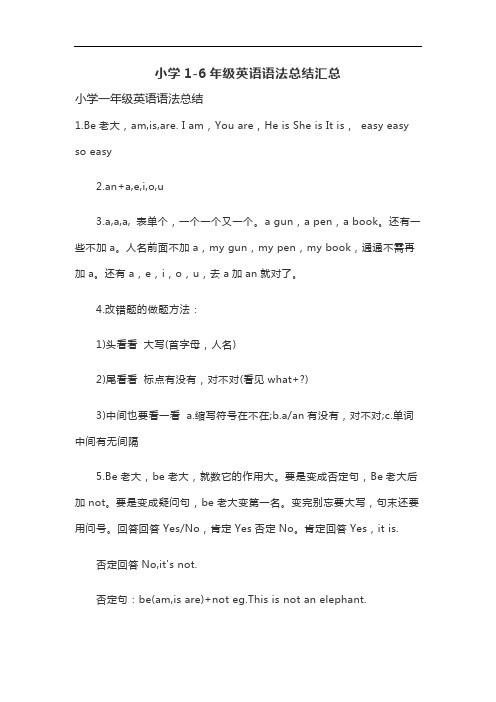
小学1-6年级英语语法总结汇总小学一年级英语语法总结1.Be老大,am,is,are. I am,You are,He is She is It is,easy easy so easy2.an+a,e,i,o,u3.a,a,a, 表单个,一个一个又一个。
a gun,a pen,a book。
还有一些不加a。
人名前面不加a,my gun,my pen,my book,通通不需再加a。
还有a,e,i,o,u,去a加an就对了。
4.改错题的做题方法:1)头看看大写(首字母,人名)2)尾看看标点有没有,对不对(看见what+?)3)中间也要看一看a.缩写符号在不在;b.a/an有没有,对不对;c.单词中间有无间隔5.Be老大,be老大,就数它的作用大。
要是变成否定句,Be老大后加not。
要是变成疑问句,be老大变第一名。
变完别忘要大写,句末还要用问号。
回答回答Yes/No,肯定Yes否定No。
肯定回答Yes,it is.否定回答No,it's not.否定句:be(am,is are)+not eg.This is not an elephant.Is this a monkey?(一般疑问句)Yes,it is. It's a monkey. --------(肯定回答)No,it's not. It's a bear. --------(否定回答)注意哦:I am a girl.变成一般疑问句是Are you a girl?6.反义词,了不起,高矮胖瘦和老幼。
Tall,short,fat,thin,old,young.肯定回答抄原题,否定回答找反义。
Eg.1)Is he tall? Yes,he is.He is tall.2)Is she tall?No,she isn't.She is short.*思考一下:1.Is your mother fat?(否定回答)No,she isn,t.She is thin.2.Is your father short and fat?(否定回答)No,he isn't.He is tall and thin.6.高矮胖瘦年轻老,形容你我刚刚好。
小学一到六年级英语重点知识归纳

小学一到六年级英语重点知识归纳一:学生易错词汇1. a, an的选择: 元音字母开头的单词用an,辅音字母开头的单词用a.2. am , is , are的选择: 单数用is , 复数用are. I 用am , you 用are.3. have , has 的选择: 表示某人有某物.单数用has , 复数用have. I ,you 用have .4. there is, there are 的选择:表示某地有某物,某人.单数用there is , 复数用there are.5. some, any 的选择:肯定句用some, 疑问句和否定句用any.6. 疑问词的选择:what (什么) who (谁) where (哪里) whose (谁的) why(为什么)when(什么时候)which(哪一个)how old (多大) how many (多少)how much(多少钱)二:形容词比较级详解当我们需要对事物作出比较时,需要用到比较级.比较级的句子结构通常是:什么+ 动词be (am , is , are ) + 形容词比较级+ than(比)+ 什么,如:I'm taller and heavier than you. (我比你更高和更重.)An elephant is bigger than a tiger. (一只大象比一只老虎更大.)形容词的比较级是在形容词的基础上变化而来的,它的变化规则是:①一般的直接在词尾加er ,如tall - taller , strong - stronger ,②以e结尾的,直接加r ,如fine –finer ,③以辅音字母加y结尾的,先改y为i再加er,如funny - funnier④双写最后的字母再加er,如big –bigger, thin –thinner ,hot –hotter☆注意☆比较的两者应该是互相对应的可比较的东西.典型错误:My hair is longer than you.(我的头发比你更长.)比较的两者是我的头发,你(整个人),那么比较的对象就没有可比性.应该改为:My hair is longer than yours. 或My hair is longer than your hair.比较级专项练习: 一,从方框中选出合适的单词完成句子heavy tall long big(1) How is the Yellow River(2) How is Mr Green He's 4375px.(3) How are your feet I wear size 18.(4)How is the fish It's 2kg.三:动词过去式详解动词的过去式的构成规则有:A,规则动词①一般直接在动词的后面加ed:如worked , learned , cleaned , visited②以e结尾的动词直接加d:如lived , danced , used ③以辅音字母加y结尾的动词要改y为i再加ed(此类动词较少)如study –studied carry –carried worry –worried (注意play,stay不是辅音字母加y,所以不属于此类)④双写最后一个字母(此类动词较少)如stoppedB,不规则动词(此类词并无规则,须熟记)小学阶段要记住以下动词的原形和过去式:sing –sang , eat –ate , see –saw , have –had , do –did , go - went , take - took , buy - bought , get - got , read - read ,fly - flew , am/is - was ,are - were , say - said , leave - left , swim - swam , tell - told , draw - drew , come - came , lose - lost , find - found , drink - drank , hurt - hurt , feel - felt四:动词现在分词详解动词的ing形式的构成规则:①一般的直接在后面加上ing , 如doing , going , working , singing , eating②以e 结尾的动词,要先去e再加ing ,如having , writing③双写最后一个字母的(此类动词极少)有:running , swimming , sitting , getting五:人称代词六:句型专项归类1.肯定句:是指用肯定的语气来陈述的句子,如:I'm a student. She is a doctor. He works in a hospital.There are four fans in our classroom. He will eat lunch at 12:00. I watched TV yesterday evening.2,否定句:含有否定词或表示否定意义词的句子,如:I'm not a student. She is not (isn't) a doctor.He does not (doesn't) work in a hospital. There are not (aren't) four fans in our classroom.He will not (won't) eat lunch at 12:00. I did not (didn't) watch TV yesterday evening.☆注意☆小结:否定句主要是在肯定句的基础上加上了否定词"not".有动词be的句子则"not"加在be后面,可缩写成"isn't,aren't",但amnot 一般都分开写.没有动词be的句子则要先在主要动词的前面加上一个助动词(do,does,did),然后在它后面加上"not",你也可以把它们缩写在一起如"don't , doesn't , didn't ).这三个助动词要根据人称和时态来选择,其中"does"只用于一般现在时主语是第三人称单数的情况,而"did"只用于一般过去时,不论主语是什么人称和数,都用"did" .3,一般疑问句:是指询问事实的句子,此类句子必须用"yes",或"no"来回答.如:Are you a student Yes, I am / No, I'm not.Is she a doctor Yes, she is. / No, she isn't.Does he work in a hospital Yes, he does. / No, he doesn't.Are there four fans in our classroom Yes, there are. / No, there aren't.Are you going to buy a comic book tonight Yes, I am. / No, I am not. (Yes, we are. / No, we aren't.)Will he eat lunch at 12:00 Yes, I will. / No, I will not(won't).Are they swimming Yes, they are. / No, they aren't.Did you watch TV yesterday evening Yes, I did. / No, I didn't.☆注意☆小结:一般疑问句是在肯定句的基础上,①把动词be调到首位,其他照写,末尾标点符号变成问号即可.②没有动词be的句子则要在句首加上一个助动词(do,does,did)再把紧跟在后面的动词变回原形,末尾标点符号变成问号即可.这三个助动词也要根据人称和时态来选择,其中"does"只用于一般现在时主语是第三人称单数的情况,而"did"只用于一般过去时,不论主语是什么人称和数,都用"did" .一般疑问句有个重要的原则就是问和答要一致,即问句里的第一个单词(助动词)和简略答句里的这个词是一致的.4,特殊疑问句:以特殊疑问词(what , where , who , which , when , whose , why , how等)开头引导的句子.此类句子应该问什么就答什么,不能用"yes ,no"来回答.如:What is this It's a computer.What does he do He's a doctor.Where are you going I'm goingto Beijing.Who played football with you yesterday afternoon Mike.Which season do you like best Summer.When do you usually get up I usually get up at 6:30.Whose skirt is this It's Amy's.Why do you like spring best Because I can plant trees.How are you I'm fine. / I'm happy.How did you go to Xinjiang I went to Xinjiang by train.☆其中how又可以和其他一些形容词连用组成特殊疑问词组用来提问,如: how many(多少(数量)), how much(多少(钱)), how tall(多高), how long(多长), how big(多大), how heavy(多重)例句:How many pencils do you have I have three pencils.How many girls can you see I can see four girls.How many desks are there in your classroom There are 51.☆小结:how many 用来提问可数名词的数量,主要有以上三种搭配,How many + 名词复数+ do you have 你有多少……How many + 名词复数+ can you see 你能看见多少……How many + 名词复数+ are there…有多少……七:完全,缩略形式:I'm=I am he's=he is she's=she is they're=they are you're=you are there's=there is they're=they are can't=can not don't=do not doesn't=does not isn't=is not aren't=are not let's=let us won't=will not I'll=I will wasn't=was not总结:通常情况下,'m即am,'s即is(但let's=let us), 're即are ,n't即not (但can't=can not)小学一到六年级英语重点知识归纳。
2010-2011学年度第二学期小学英语1--6年级单词、词组表

* * * * * *
*
* * * * * * * *
* * * *
Unit 3 Whose CDs? quiet 安静 * please 请 * kite 风筝 * study 学习;书房 whose 谁的 reen Berries!
密云县小学英语三年级单词表
* * 三年级 Unit 1 Don't walk left 左 ;左边 right 右;右边 again 再;又 litter 乱扔;乱丢 very (good) 很;非常 touch 触;摸 move 动;移动 money 钱;货币 worry 担心;着急 cry 哭;喊 food 食品;食物 smoking 吸烟 camera 照相机 apple 苹果 walk 走 run 跑 cat 猫 wait 等;等待 Unit 2 How much bee 蜜蜂 card 卡;卡片 egg 蛋;鸡蛋 (thank) yo (谢谢)你 toy 玩具 train 火车 (how) much 多少 the change 零钱;零头 stop 停 eleven 11 twelve 12 thirteen 13 fourteen 14 fifteen 15 sixteen 16 seventeen 17 eighteen 18 nineteen 19 twenty 20 video 录像带 sorry 对不起;抱歉 * radio 无线电;收音机 table 桌子 keyboard 键盘 vegetables * fruit pie * what 蔬菜 水果 派;馅饼 * 什么 * Unit 8 Big bird! forest 森林 help 帮助 * swim 游泳 tall 高 young 年轻的 bad 坏的 * good 好的 * short 短、短的 * old 年老的 * woman 妇女 man 男人 * fat 胖的 * thin 瘦的 * long 长的 animal 动物 Unit 9 Hot soup! vest 背心 van 封闭货车 tea 茶 juice 果汁 hungry 饿;饥饿 thirsty 渴 milk 牛奶 cold 凉,凉的 soup 汤 favorite 最喜欢的 hot 热,热的 some 一些 sweet 甜的 sour 酸的 rice 米饭 water 水 Unit10 Mocky's store match 火柴;连线 stamp 邮票 sea 海 store 商店 want 要;想要 new 新的 clock 时钟 sell 卖;出售 thing 物品 cap 便帽;制服帽 newspaper 报纸 T-shirt T恤衫 purse 女用钱包 watch 手表 jacket 夹克衫 Unit 11 Green Berries! with 和 well 身体健康的 stomach 胃,肚子 stomachach 胃、肚子疼 hurt 损伤 say 说 drink 喝 today 今天 better 康复的 hair 发;毛发 head 头 eye 眼 nose 鼻子 mouth 嘴 tongue 舌 chest 胸 ear 耳 shoulder 肩 face 脸 arm 手臂 hand 手 finger 手指 knee 膝 leg 腿 foot 脚 toe 脚趾 Unit 12 Review ticket 票 train 火车 watch 手表
小学英语总复习资料(1-6册)

小学英语总复习资料(1-6册)一、字母1、字母表:要求能够按照顺序默写字母表(大小写),书写正确、规范。
书写口诀:大写字母占两格,上格、中格不顶格,小写字母看清格,书写注意占满格(t ,f 除外)。
2、字母的笔顺。
大写字母C G J L O S V W Z9个字母书写时笔尖不离开纸面,都必须一笔写成。
大写字母B D K M N Q R T U X Y,书写时都是两笔完成。
大写字母A E F H I5字母书写时都是三笔完成。
小写字母除f i j t x 5个字母书写时是两笔完成外,其余小写字母都是一笔完成。
3、元音字母:要熟练掌握五个元音字母:A, a, E, e, I , i , O , o , U, u.4、按发音分类。
能够按照字母的发音将它们分类,含有相同音素的字母归为一组。
主要题型有:选出一组字母中的不同类的一个,按发音将字母分类。
(1)A: A H J K (2) E: B C D E G P T V (3) I: I Y (4) O: O(5) U: U Q W (6) R (7) F : F L M N S X Z5、常用简写形式的含义。
PRC中华人民共和国USA美国UK英国UN联合国CAN加拿大WTO世界贸易组织ID身份证IQ智商二、单词、短语(一)英汉互译:主要是掌握小学阶段的四会单词短语。
凡是课本是带五角星的单词都要求会听、说、读、写。
(二)名词复数。
(1)、一般在词尾加-s,s在元音或浊辅音后面读【z】,在清辅音后面读【s】。
在 t后面与t 一起读作【ts】在d后面与d一起读作【dz】。
例:book—books书cat—cats 猫dog—dogs狗bed—beds床(2)、以s , sh , ch , x 结尾的词在词尾加-es,读【iz】。
例:class—classes 班级watch—watches 手表box—boxes 盒子brush—brushes刷子(3)、以o结尾的名词,有生命的名词加-es,没有生命的名词加-s,例:tomato—tomatoes 西红柿potato—potatoes 土豆photo—photos相片radio—radios 收音机zoo—zoos动物园(4)、以f , fe结尾的名词,先把f,fe变为v,再加-es,词尾ves读作【vz】。
小学英语1-6年级要点知识点汇总(背熟期末考满分)

小学英语1-6年级要点知识点汇总(背熟期末考满分)第一部分:基础知识1.字母:26个字母的大小写ABCDEFGHIJKLMNOPQRSTUVWXYZabcdefghijklmnopqrstuvwxyz2.语音:元音的发音五个元音字母:AEIOU12个单元音:前元音:[i:] [ɪ] /e/ [æ]中元音:[ɜ:] [ə]后元音:[ɑ:] [ɒ] [ɔ:] [u :] [ʊ] [ʌ]双元音(8个)Ⅰ.合口双元音(5个)[ai] [ei] [au] [əu] [ɔi]Ⅱ.集中双元音(3个)[iə][εə][uə]3.词汇:词汇量,近反义词4.句子:大小写,标点符号第二部分:语法知识(1)一.名词:名词单复数,名词的格(一)名词单复数1.一般情况,直接加-s,如:book-books, bag-bags, cat-cats, bed-beds2.以s. x. sh. ch结尾,加-es,如:bus-buses, box-boxes, brush-brushes, watch-watches3.以“辅音字母+y”结尾,变y为i, 再加-es,如:family-families, strawberry-strawberries4.以“f或fe”结尾,变f或fe为v, 再加-es,如:knife-knives5.不规则名词复数:man-men, woman-women, policeman-policemen, policewoman-policewomen, mouse-mice child-children, foot-feet, tooth-teeth, fish-fish, people-people, Chinese-Chinese, Japanese-Japanese不可数名词的复数就是原型:paper, juice, water, milk, rice, tea(二)名词的格(1) 有生命的东西的名词所有格:a) 单数后加’s 如: Lucy’s ruler my father’s shirtb) 以s 结尾的复数名词后加’如: his friends’bagsc) 不以s 结尾的复数后加’s children’s shoesl并列名词中,如果把’s加在最后一个名词后,表示共有, 如:Tom and Mike’s car 汤姆和迈克共有的小汽车l要表示所有物不是共有的,应分别在并列名词后加’sTom’s and Mike’s cars 汤姆和麦克各自的小汽车(2)表示无生命东西的名词通常用“of +名词”来表示所有关系:如:a picture of the classroom a map of China第二部分:语法知识(2)二.冠词:不定冠词,定冠词种类:(1)不定冠词:a / an a unit / an uncle元音开头的可数名词前用an :an egg / an apple / an orange / an eraser / an answer / an ID card / an alarm clock / an actor / an actress / an e-mail / an address / an event / an example / an opera / an houran old man / an interesting book / an exciting sport / an action movie / an art lesson /(2)定冠词:the the egg the plane2. 用法:定冠词的用法:(1)特指某(些)人或某(些)物:The ruler is on the desk.(2)复述上文提到的人或物:He has a sweater. The sweater is new.(3)谈话双方都知道的人或物:The boys aren’t at school.(4)在序数词前:John’s birthday is February the second.(5)用于固定词组中:in the morning / afternoon / evening不用冠词的情况:(1)专有名词前:China is a big country.(2)名词前有定语:this , that , my , your , some, any , no 等:This is my baseball.(3)复数名词表示一类人和事:Monkeys can’t swim. They are teachers.(4)在节日,日期,月份,季节前:Today is Christmas Day. It’s Sunday.(5)一日三餐前:We have breakfast at 6:30.(6)球类棋类运动前:They often play football after class. He plays chess at home.* 但乐器前要用定冠词:I play the guitar very well.(7)学科名称前:My favorite subject is music.(8)在称呼或头衔的名词前:This is Mr Li.(9)固定词组中:at noon at night by bus第二部分:语法知识(3)三、代词、形容词、副词代词:人称代词,物主代词人称代词物主代词主格宾格第一人称单数I(我)memy(我的)复数we(我们)usour(我们的)第二人称单数you(你)youyour(你的)复数you(你们)youyour(你们的)第三人称单数he(他)himhis(他的)she(她)herher(她的)it(它)itits(它的)复数they(他们/她们/它们)themtheir(他们的/她们的/它们的)形容词,副词:比较级,最高级(一)、形容词的比较级1、形容词比较级在句子中的运用:两个事物或人的比较用比较级,比较级后面一般带有单词than。
1-6年级词语表
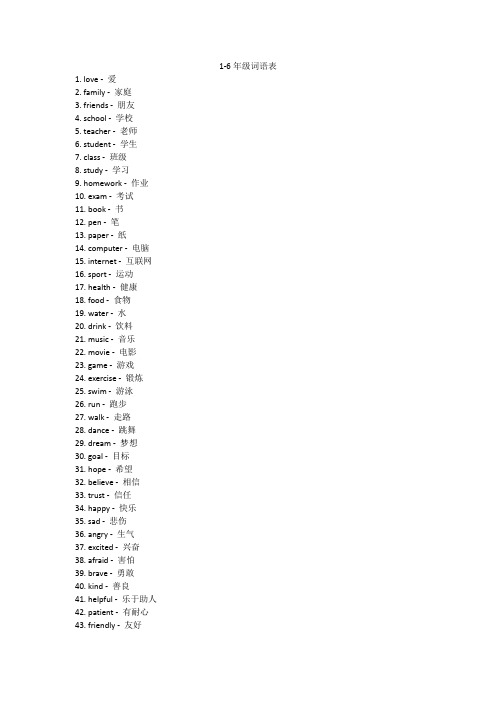
1-6年级词语表1. love -爱2. family -家庭3. friends -朋友4. school -学校5. teacher -老师6. student -学生7. class -班级8. study -学习9. homework -作业10. exam -考试11. book -书12. pen -笔13. paper -纸14. computer -电脑15. internet -互联网16. sport -运动17. health -健康18. food -食物19. water -水20. drink -饮料21. music -音乐22. movie -电影23. game -游戏24. exercise -锻炼25. swim -游泳26. run -跑步27. walk -走路28. dance -跳舞29. dream -梦想30. goal -目标31. hope -希望32. believe -相信33. trust -信任34. happy -快乐35. sad -悲伤36. angry -生气37. excited -兴奋38. afraid -害怕39. brave -勇敢40. kind -善良41. helpful -乐于助人42. patient -有耐心43. friendly -友好44. quiet -安静45. loud -大声46. smart -聪明47. intelligent -聪明48. creative -创造性49. talented -有才能50. hardworking -勤奋51. lazy -懒惰52. careless -粗心53. strict -严格54. funny -有趣55. interesting -有趣56. boring -无聊57. quiet -安静58. noisy -吵闹59. lazy -懒惰60. active -活跃61. relaxed -放松62. tense -紧张63. calm -平静64. excited -兴奋65. frightened -害怕66. surprise -惊喜67. disappointment -失望68. success -成功69. failure -失败70. progress -进步71. improvement -改进72. challenge -挑战73. difficulty -困难74. problem -问题75. solution -解决方法76. skill -技能77. talent -天才78. opportunity -机会79. choice -选择80. decision -决定81. responsibility -责任82. permission -许可83. advice -建议84. help -帮助85. support -支持86. encouragement -鼓励87. praise -表扬88. criticism -批评89. complaint -抱怨90. apologize -道歉91. forgive -原谅92. respect -尊重93. gratitude -感激94. hope -希望95. expectation -期望96. wish -愿望97. dream -梦想98. goal -目标99. ambition -野心100. success -成功。
英语一到六年级语法
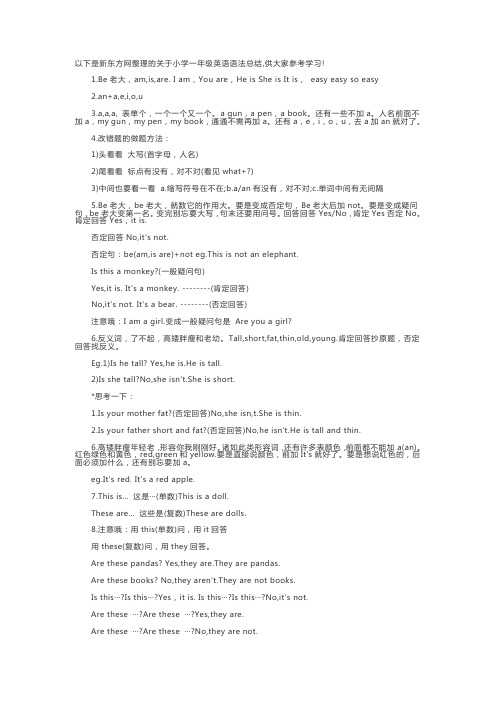
1.Be老大,am,is,are. I am,You are,He is She is It is,easy easy so easy2.an+a,e,i,o,u3.a,a,a, 表单个,一个一个又一个。
a gun,a pen,a book。
还有一些不加a。
人名前面不加a,my gun,my pen,my book,通通不需再加a。
还有a,e,i,o,u,去a加an就对了。
4.改错题的做题方法:1)头看看大写(首字母,人名)2)尾看看标点有没有,对不对(看见what+?)3)中间也要看一看 a.缩写符号在不在;b.a/an有没有,对不对;c.单词中间有无间隔5.Be老大,be老大,就数它的作用大。
要是变成否定句,Be老大后加not。
要是变成疑问句,be老大变第一名。
变完别忘要大写,句末还要用问号。
回答回答Yes/No,肯定Yes否定No。
肯定回答Yes,it is.否定回答No,it's not.否定句:be(am,is are)+not eg.This is not an elephant.Is this a monkey?(一般疑问句)Yes,it is. It's a monkey. --------(肯定回答)No,it's not. It's a bear. --------(否定回答)注意哦:I am a girl.变成一般疑问句是Are you a girl?6.反义词,了不起,高矮胖瘦和老幼。
Tall,short,fat,thin,old,young.肯定回答抄原题,否定回答找反义。
Eg.1)Is he tall? Yes,he is.He is tall.2)Is she tall?No,she isn't.She is short.*思考一下:1.Is your mother fat?(否定回答)No,she isn,t.She is thin.2.Is your father short and fat?(否定回答)No,he isn't.He is tall and thin.6.高矮胖瘦年轻老,形容你我刚刚好。
人教PEP版小学1-6年级英语重难点知识大汇总
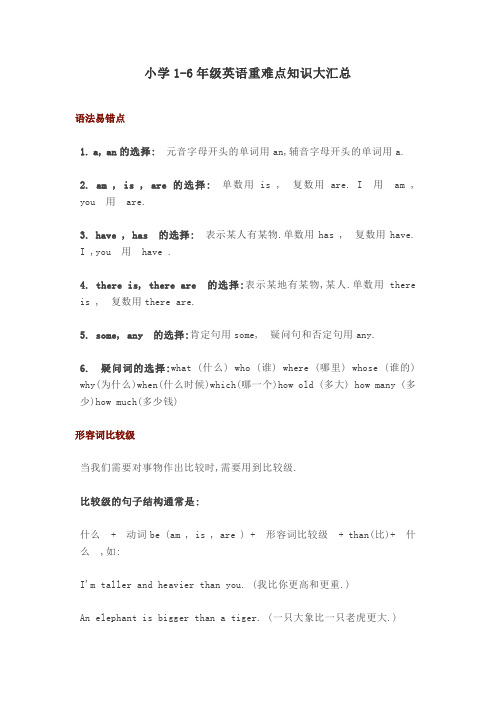
小学1-6年级英语重难点知识大汇总语法易错点1. a, an的选择: 元音字母开头的单词用an,辅音字母开头的单词用a.2. am , is , are的选择: 单数用is , 复数用are. I 用am , you 用are.3. have , has 的选择: 表示某人有某物.单数用has , 复数用have.I ,you 用have .4. there is, there are 的选择:表示某地有某物,某人.单数用there is , 复数用there are.5. some, any 的选择:肯定句用some, 疑问句和否定句用any.6. 疑问词的选择:what (什么) who (谁) where (哪里) whose (谁的) why(为什么)when(什么时候)which(哪一个)how old (多大) how many (多少)how much(多少钱)形容词比较级当我们需要对事物作出比较时,需要用到比较级.比较级的句子结构通常是:什么+ 动词be (am , is , are ) + 形容词比较级+ than(比)+ 什么,如:I'm taller and heavier than you. (我比你更高和更重.)An elephant is bigger than a tiger. (一只大象比一只老虎更大.)形容词的比较级是在形容词的基础上变化而来的,它的变化规则是:①一般的直接在词尾加er ,如tall - taller , strong - stronger ,②以e结尾的,直接加r ,如fine – finer ,③以辅音字母加y结尾的,先改y为i再加er,如funny - funnier④双写最后的字母再加er,如big – bigger, thin – thinner ,hot – hotter☆注意☆比较的两者应该是互相对应的可比较的东西.典型错误:My hair is longer than you.(我的头发比你更长.)比较的两者是我的头发,你(整个人),那么比较的对象就没有可比性.应该改为:My hair is longer than yours. 或My hair is longer than your hair.动词过去式动词的过去式的构成规则有:A,规则动词①一般直接在动词的后面加ed:如worked , learned , cleaned , visited②以e结尾的动词直接加d:如lived , danced , used③以辅音字母加y结尾的动词要改y为i再加ed(此类动词较少)如study –studied carry –carried worry –worried (注意play,stay不是辅音字母加y,所以不属于此类)④双写最后一个字母(此类动词较少)如stoppedB,不规则动词(此类词并无规则,须熟记)小学阶段要记住以下动词的原形和过去式:sing – sang , eat – ate , see – saw , have – had , do – did , go - went , take - took , buy - bought , get - got , read - read ,fly - flew , am/is - was , are - were , say - said , leave - left , swim - swam , tell - told , draw - drew , come - came , lose - lost , find - found , drink - drank , hurt - hurt , feel - felt动词现在分词详解①一般的直接在后面加上ing , 如doing , going , working , singing , eating②以e 结尾的动词,要先去e再加ing ,如having , writing③双写最后一个字母的(此类动词极少)有:running , swimming , sitting , getting人称代词主格及宾格人称代词分为主格和宾格,主格和宾格区别:主格和宾格汉语意思相同,但位置不同。
小学六年级英语Unit1-Unit6知识清单
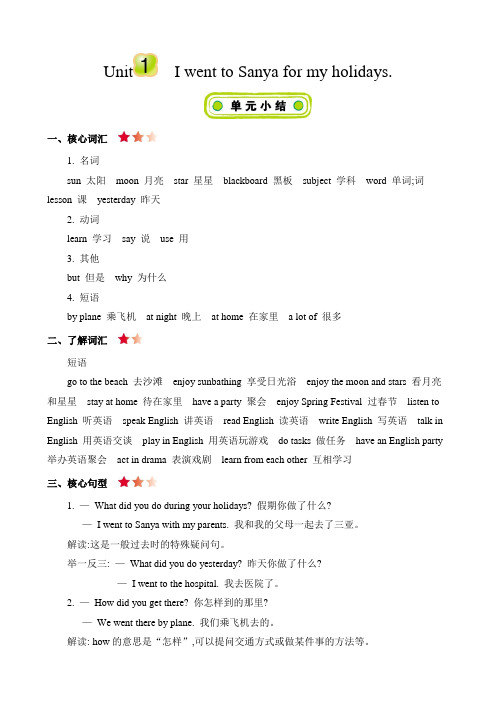
Unit I went to Sanya for my holidays.一、核心词汇1. 名词sun 太阳moon 月亮star 星星blackboard 黑板subject 学科word 单词;词lesson 课yesterday 昨天2. 动词learn 学习say 说use 用3. 其他but 但是why 为什么4. 短语by plane 乘飞机at night 晚上at home 在家里 a lot of 很多二、了解词汇短语go to the beach 去沙滩enjoy sunbathing 享受日光浴enjoy the moon and stars 看月亮和星星stay at home 待在家里have a party 聚会enjoy Spring Festival 过春节listen to English 听英语speak English 讲英语read English 读英语write English 写英语talk in English 用英语交谈play in English 用英语玩游戏do tasks 做任务have an English party 举办英语聚会act in drama 表演戏剧learn from each other 互相学习三、核心句型1. —What did you do during your holidays? 假期你做了什么?—I went to Sanya with my parents. 我和我的父母一起去了三亚。
解读:这是一般过去时的特殊疑问句。
举一反三: —What did you do yesterday? 昨天你做了什么?—I went to the hospital. 我去医院了。
2. —How did you get there? 你怎样到的那里?—We went there by plane. 我们乘飞机去的。
解读: how的意思是“怎样”,可以提问交通方式或做某件事的方法等。
(完整版)小学1至6年级英语单词
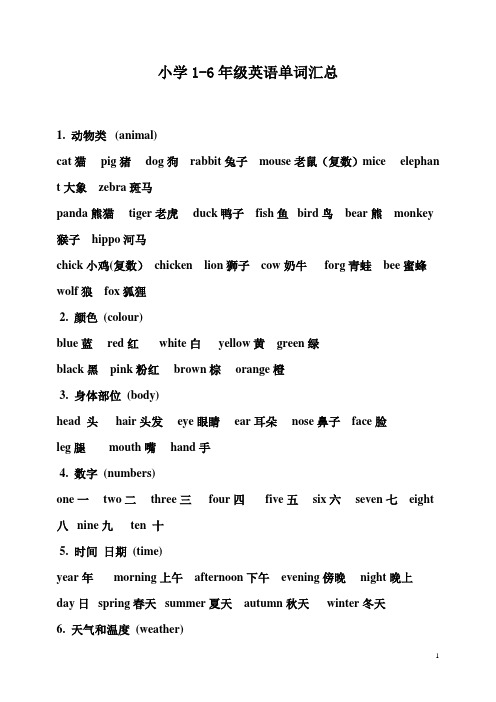
小学1-6年级英语单词汇总1. 动物类(animal)cat猫pig猪dog狗rabbit兔子mouse老鼠(复数)mice elephan t大象zebra斑马panda熊猫tiger老虎duck鸭子fish鱼bird鸟bear熊monkey 猴子hippo河马chick小鸡(复数)chicken lion狮子cow奶牛forg青蛙bee蜜蜂wolf狼fox狐狸2. 颜色(colour)blue蓝red红white白yellow黄green绿black黑pink粉红brown棕orange橙3. 身体部位(body)head 头hair头发eye眼睛ear耳朵nose鼻子face脸leg腿mouth嘴hand手4. 数字(numbers)one一two二three三four四five五six六seven七eight 八nine九ten 十5. 时间日期(time)year年morning上午afternoon下午evening傍晚night晚上day日spring春天summer夏天autumn秋天winter冬天6. 天气和温度(weather)cold冷的cool凉爽的warm温暖的hot热sunny晴朗的cloudy多云的windy有风的rainy下雨的snowy下雪的7. 交通工具car小汽车bicycle自行车van面包车8. 食物饮料三餐味道水果dinner晚饭,正餐 (food)食物rice 米饭noodles面条egg蛋cake蛋糕mooncake月饼hot dog热狗hamburger汉堡包noodles面条soup汤chicken鸡肉meat肉fish鱼pizza匹萨pie派jelly果冻sweet糖果bicuit饼干(drink)饮料water水juice果汁Coke可乐ice-cream冰激凌ice冰milk牛奶(fruit)水果orange桔子apple苹果pear梨banana香蕉lemon柠檬peach桃子9.职业(jobs)farmer农民teacher教师10. 反义词big---small大的/小的long ---short长的/短的tall--- short高的/矮的thin--- fat瘦的/胖的new---old新的/旧的old ---young年长的/年青的cold ---hot冷的/热的go---come 来/去up---down 上/下yes----- no是/不11. 衣服(clothes)T-shirt T恤衫shirt衬衫skirt短裙dress连衣裙shorts短裤blo use女式衬衫12.地方(place)home家room房间kitchen厨房classroom教室park公园zoo动物园garden花园13. 代词I 我you你he他she她it它we我们you 你们they 他(她、它)们my我的your你的his 他的her她的its它的our我们的your你们的their他(她、它)们的me我(宾格) you him her14.方位及方位介词in在…里on在…上under在…下面15.心情及患病happy高兴的16.自然景物sky天空sun太阳cloud云wind风rain雨star星星moon 月亮17.疑问词what什么what color什么颜色what time什么时间why为什么who 谁where哪里when什么时候how多么,怎样how old几岁how many多少(hi hello)打招呼good好goodbye再见do坐can能、会be动词是(is are am)(have has)有give给like喜欢of属于---的for为、对---please请 thank谢谢nice美丽but但是19.植物(plant)tree树flower花grass草forest森林20. 动词及词组swim游泳fly飞jump跳run跑ride骑look看skip跳play玩eat吃sit坐drink water喝水dance跳舞read阅读sing唱歌draw画画look at向、朝----看 go home回家go swimming去游泳read a book看书sing and dance唱歌跳舞fly kites 放风筝ride a bicycle骑车cook dinner做晚饭21.文具、家具等物品bag书包pen钢笔pencil铅笔ruler尺子rubber橡皮book书penc il-case铅笔盒chair椅子desk课桌table桌子TV电视window窗户box盒子te acher’s desk讲台22. 性别及家庭成员boy 男孩girl女孩Mrs 女士Mr.先生Miss小姐mother母亲mum妈妈(口语)father 父亲dad爸爸(口语)parents 父母grandmother祖母grandma奶奶(口语)grandfather祖父grandpa爷爷(口语)uncle叔叔aunt阿姨sister姐妹brother兄、弟man男人friend朋友23.玩具ball球doll洋娃娃kite风筝bicycle自行车umbrella伞gift礼物card卡firecracker鞭炮firework烟火window窗slide滑滑梯swing秋千seesaw翘翘板net网24.形容词smooth光滑的soft柔软的二、句型1.单数用is,复数用are 列:My nose is small,but my eyes are big.2.三个be动词的用法列:I ---- am搞清楚三种人称you ----- arehe\she\it------is3.What do you see/hear? I see/hear ----.What can you see/hear? I can see/hear -----.4.like+名词复数列:I like apples.like to +动词I like to swim.5.for+宾格列;It's for me.6.How many+名词复数列:How many bowls?there is+名词单数There is a bowl./There is one.there are+名词复数There are four bowls.there is some + 不可数名词There is some water.7.人称+like 列:I/You like-------.she/he/it likes -------.英语三年级Unit 1boy 男孩 girl 女孩teacher 教师student 学生this 这个my 我的friend 朋友I’m=I am 我是nice 好的;愉快的good morning 早上好good afternoon 下午好meet 遇见;碰见goodbye 再见too 也;太Unit 2father 父亲;爸爸dad 爸爸(口语)mother 母亲;妈妈mom 妈妈(口语)man 男人woman 女人grandmother (外)祖母grandma (口语)(外)祖母grandfather (外)祖父grandpa (口语)(外)祖父sister 姐妹brother 兄妹let’s=let us 让我们great 太好了really 真地;确切地and 和;并且how 多么;怎么样Unit 3eleven 十一twelve 十二thirteen 十三fourteen 十四fifteen 十五sixteen 十六seventeen 十七eighteen 十八nineteen 十九twenty 二十 how many 多少can 能够;可以look at 看;瞧Unit 4peach 桃pear 梨orange 橙子watermelon 西瓜apple 苹果banana 香蕉strawberry 草莓grape 葡萄like 喜欢some 一些;某些thanks 多谢Unit 5bus 公共汽车bike 自行车taxi 出租车jeep 吉普车desk 课桌chair 椅子walkman 随身听lamp 台灯your 你的;你们的zoo 动物园Unit 6small 小的big 大的long 长的short 短的;矮的tall 高的giraffe 长颈鹿deer 鹿四年级上册四会单词词汇表Unit 1computer(计算机) board(写字板) fan(风扇) light(灯) this(这;这个) is(是)my(我的) that(那;那个) your(你的) teacher’s desk(讲台) picture(图画;照片) wall(墙壁) floor(地板) yes(是;是的) it(它)Unit 2one(一) two(二) three(三) four(四) five(五) six(六) seven(七) eight(八) nine(九) ten(十) what(什么) time(时间) it’s=itis …o’clock(…点钟) math(数学) Chinese(语文) English(英语)P.E.(体育) music(音乐) for(为;给) class(课程)Unit 3jacket(夹克衫) shirt(衬衫) skirt(裙子) dress(连衣裙) T-shirt(T恤衫) red(红色的) blue(蓝色的) yellow(黄色的) green(绿色的) white(白色的) no(不;不是) not(不;不是的) colour(颜色)Unit 4warm(暖和的) cold(寒冷的) cool(凉爽的) today(今天) jeans(牛仔裤) pants(长裤) socks(袜子) shoes(鞋子) let’s=let us play(玩;踢) football(足球) snowy(下雪的) sunny(晴朗的)Unit 5how much(多少钱) big(大的) small(小的) long(长的) short(短的) apple(苹果) banana(香蕉) pear(梨) orange(橙子) watermelon(西瓜) are(是) they 它(他、她)们Unit 6horse(马) aren’t=are not c at(猫) rabbit(兔子) pig(猪) duck(鸭子) dog(狗) eleven(十一) twelve(十二) thirteen(十三) fifteen(十五) twenty(二十) how many(多少) there(那儿;那里)四年级下册四会单词词汇表Unit 1computer(计算机) board(写字板) fan(风扇) light(灯) this(这;这个) is(是) my(我的) that(那;那个) your(你的) teacher’s desk(讲台) picture(图画;照片) wall(墙壁) floor(地板) yes(是;是的) it(它) Unit 2one(一) two(二) three(三) four(四) five(五) six(六) seven(七) eight(八) nine(九) ten(十) what(什么) time(时间) it’s=itis …o’clock(…点钟) math(数学) Chinese(语文) English(英语)P.E.(体育) music(音乐) for(为;给) class(课程)Unit 3jacket(夹克衫) shirt(衬衫) skirt(裙子) dress(连衣裙) T-shirt(T 恤衫) red(红色的) blue(蓝色的) yellow(黄色的) green(绿色的)white(白色的) no(不;不是) not(不;不是的) colour(颜色) Unit 4warm(暖和的) cold(寒冷的) cool(凉爽的) today(今天) jeans(牛仔裤) pants(长裤) socks(袜子) shoes(鞋子) let’s=let us play(玩;踢) football(足球) snowy(下雪的) sunny(晴朗的)Unit 5how much(多少钱) big(大的) small(小的) long(长的) short(短的) apple(苹果) banana(香蕉) pear(梨) orange(橙子) watermelon(西瓜) are(是) they 它(他、她)们Unit 6horse(马) aren’t=are not cat(猫) rabbit(兔子) pig(猪) duck(鸭子) dog(狗) eleven(十一) twelve(十二) thirteen(十三) fifteen(十五) twenty(二十) how many(多少) there(那儿;那里)五年级上册四会单词词汇表Unit 1Young (年轻的) funny (滑稽可笑的) tall (高的)strong (强壮的) kind (和蔼的、亲切的) old (年老的) short (矮的)thin (瘦的) Mr (先生) like (像、喜欢) strict (严格的) smart (聪明的、巧妙的) active (积极的、活跃的) quiet (安静的、文静的)very (很、非常) but (但是)Unit 2Mondy (星期一) Tuesday (星期二) Wednesday (星期三) Thursday (星期四) Friday (星期五) Saturday (星期六) Sunday (星期天) day (天) have (有、吃) on (在…..时候) do homework (做作业) watch TV (看电视) read books (读书)Unit 3eggplant (茄子) fish (鱼) green beans (青豆) tofu (豆腐) potato (土豆) tomato (西红柿) for (为) lunch (中餐) we (我们) tasty (好吃的) sweet (甜的) sour (酸的) fresh (新鲜的) salty (咸的) favourite (最喜欢的) they are (他们是) fruit (水果) grape (葡萄)Unit 4Cook the meals (倒垃圾) water the flowers (浇花) sweep the floor (扫地) clean the bedroom (打扫卧室) make the bed (铺床) set the table (摆饭桌)wash the clothes (洗碗碟) do the dishes (收拾衣服) use a computer (使用计算机)Unit 5curtain (空调) trash bin (垃圾箱) closet (壁橱) mirror (镜子) end table (床头柜) bedroom (卧室) kitchen (厨房) bathroom(卫生间) living room (客厅) in (在…里面) on (在…上面) under (在…下面) near (在..旁边) behind (在…后边) clothes (衣服)Unit 6river (河流) flower (花) grass (草) lake (湖泊) forest (森林) path (路) pake (公园) picture (照片) hourse (房子) bridge (桥) tree (树) road (公路) building (建筑物) clean (干净的)五年级下册四会单词词汇表Unit 1do morning exercises(晨练) eat breakfast(吃早饭) have english class (上英语课) play sports(进行体育运动) eat dinner(吃晚饭) when (什么时候) evening(夜晚;晚上) get up(起床) at(在……点钟)usually(通常;一般) noon(中午) climb mountains(爬山) go shopping (购物;买东西) play the piano(弹钢琴) visit grandparents(看望祖父母) go hiking(去远足) weekend(周末) often(经常) sometimes (有时候)Unit 2spring(春天) summer(夏天) fall(秋天) winter(冬天) season 季节) which(哪一个) best(最;极) swim(游泳) fly kites(放风筝) skate(滑冰;滑冰鞋) make a snowman(堆雪人) plant trees(种树) why(为什么) because(因为) sleep(睡觉)Unit 3Jan./January(一月) Feb./February(二月) Mar./March(三月)Apr./April(四月) May(五月) June(六月) July(七月) Aug./Augest (八月) Sept./September(九月) Oct./October(十月) Nov./November (十一月) Dec./December(十二月) birthday(生日) uncle(叔叔;舅舅) her(她的) date(日期)Unit 4draw pictures(画画)cook dinner(做饭) read a book(看书)answer the phone(接电话) listen to music9(听音乐) clean the room(打扫房间) write a letter(写信)write an e-mail(写电子邮件) mom (妈妈)grandpa(爷爷;外公)study(书房)Unit 5fly(飞) jump(跳) walk(走) run(跑) swim(游泳) kangaroo (袋鼠) sleep(睡觉) climb(往上爬) fight(打架) swing(荡;荡秋千) drink water(喝水)Unit 6take pictures(照相) watch insects(观察昆虫) pick up leaves(采摘树叶) do an experiment(做实验) catch butterfly(捉蝴蝶) honey (蜂蜜) count insects(数昆虫) collect leaves(收集树叶) wtite a report(写报告) play chess(下棋) have a picnic(举行野餐)六年级上册四会单词词汇表Unit 1by (经,乘) foot(脚) bike(自行车) bus(公共汽车) train(火车) how(怎样) go to school(上学) traffic(交通) traffic light(交通灯) traffic rule(交通规则) stop(停,停车站)wait(等待) get to(到达)Unit 2library(图书馆) post office(邮局) hospital(医院) cinema(电影院) bookstore(书店) where(在哪里,到哪里) please(请) next to(与…相邻) turn(转弯) right (右边) left(左边) straight(成直线地) then (然后) Unit 3next week(下周) this morning(今天上午) this afternoon(今天下午) this evening (今天晚上) comic book(漫画书) post card(明信片) newspaper(报纸) buy(购买)Unit 4hobby(爱好) ride a bike--riding a bike(骑自行车) dive--diving(跳水) play the violin—playing the violin(拉小提琴) make kites—making kites(制作风筝) collect stamps—collecting stamps(集邮) live–lives(居住) teach--teaches(教) go--goes(去) watch--watches(看) read--reads(读,看) does doesn’t=does notUnit 5singer(歌唱家,歌手) writer(作家) actor(男演员) actress(女演员) artist(画家) TV reporter(电视台记者) engineer(工程师) accountant(会计) policeman(男警察) salesperson(销售员) cleaner(清洁工) where(在哪里,到哪里) work(工作)Unit 6rain(雨) cloud (云) sun(太阳) stream(河,溪) come from(来自,从…来) seed(种子) soil(土壤) sprout (苗,芽) plant(植物,种植) should (应该) then(然后)六年级下册四会单词词汇表Unit 1tall—taller更高的 short—shorter 更矮的 strong—stronger 更强壮的 old—older 年龄更大的 young—younger 更年轻的 big—bigger 更大的heavy—heavier 更重的 long—longer 更长的 thin—thinner 更瘦的small—smaller (体型)更小的Unit 2have a fever 发烧 have a sore throat喉咙疼 have a cold感冒 have a toothache 牙疼 have a headache 头疼 matter事情,麻烦 sore 疼的hurt疼痛 nose 鼻子 tired疲劳的,累的 excited兴奋的 angry生气的happy高兴的 bored无聊的,烦人的 sad 忧伤的,悲伤的Unit 3watch—watched 看 wash—washed 洗 clean—cleaned打扫play—played玩 visit—visited 看望 do—did last weekend 上一个周末 go—went去 go to a park—went to a park 去公园 go swimming—went swimming去游泳 go fishing—went fishing去钓鱼 read—read 读 go hiking—went hiking 去郊游Unit 4leran Chinese—learned Chinese学汉语 sing and dance—sang and danced 唱歌和跳舞 eat good food—ate good food吃好吃的食物 take pictures—took pictures 照相 climb—climbed 爬 have—had buy presents—bought presents买礼物 row a boat—rowed a boat 划船 see elephant—saw elephant 看大象 go skiing—went skiing 去滑雪 goice-skating—went ice-skating 去滑冰 how怎么,如何 get—got 到达last 上一个的,仅余的,留在最后的。
小学六年级的毕业考试英语总复习:动词短语、介词短语和其他词组
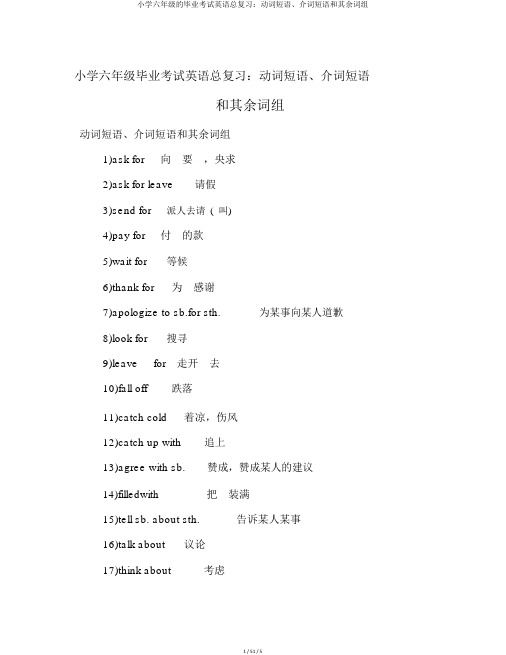
小学六年级毕业考试英语总复习:动词短语、介词短语和其余词组动词短语、介词短语和其余词组1)ask for向要,央求2)ask for leave请假3)send for派人去请(叫)4)pay for付的款5)wait for等候6)thank for为感谢7)apologize to sb.for sth.为某事向某人道歉8)look for搜寻9)leave for走开去10)fall off跌落11)catch cold 着凉,伤风12)catch up with 追上13)agree with sb. 赞成,赞成某人的建议14)filledwith 把装满15)tell sb. about sth. 告诉某人某事16)talk about 议论17)think about 考虑18)worry about 担⋯⋯19)look after 照料20)run after 追赶,跟在后边跑21)read after 跟⋯⋯22)smile at ⋯⋯微笑23)knock at 敲( 、窗 )24)shout at ⋯⋯大喊( 嚷)25)throw away 扔掉26)work hardat 努力做⋯⋯27)wait in line 排等候28)change⋯into ⋯成29)hurry into ⋯匆促入30)run into ⋯跑31)hear of 听32)think of ,考33)catch hold of 抓住34)instead of 代替⋯⋯35)hand in交上来36)stay in bed卧病在床37)hear from收到⋯⋯来信38)at once立刻39)at last 最后40)at first 开初,第一41)at the age of 在岁时42)at the end of 在之末43)at thebeginning of在之初44)at the foot of 在脚下45)at the sametime 同时46)atnight/noon 在夜里 / 中午47)with one's help在某人的协助下,因为某人的协助48)with the help of 在的协助下49)with asmile 面带笑容50)with one's own eyes 亲眼看见51)after awhile 过了一会儿52)from now on 从现在起53)from then on 从那时起54)f0r example 比方55)far awayfrom 远离56)from morningtill night 从早到晚57)by and by 不久58)by airmail 寄航空邮件59)by ordinarymail 寄平信60)by theway顺便说61)by thewindow在窗边62)by the end of到底为止63)little by little 逐渐地64)in all总合65)in fact 事实上66)in one's twenties 在某人二十几岁时67)in ahurry 匆促68)in the middleof 在中间69)in no time (ina minute) 立刻,很快70)in time (ontime) 即时71)in public 公众,公开地72)in orderto 为了73)in frontof 在前面74)in thesun 在阳光下75)in theend 最后,终于76)insurprise 惊诧地77)in turn 依次78)of course 自然79)a bit(of) 有一点儿80)a lot of 很多81)on one's way to 某人在去的路上82)on foot 步行,走路83)a talk on space 一个关于太空的报告84)on the other hand 另一方面85)at/on the weekend 在周末86)on the left(right) 在左( 右)边87)on the otherside of 在另一边88)on the radio经过收音机(无线电广播)89)to one's joy使快乐的是90)to one's surprise使惊讶的是。
小学英语1-6年级必考重点知识汇总

小学英语1-6年级必考重点知识汇总1年级:- 基本问候语:Hello、Hi、Good morning、Good afternoon、Good evening- 数字:1-10的基本数字- 颜色:red、blue、yellow、green、orange、purple、black、white- 动物:dog、cat、bird、fish、rabbit、mouse2年级:- 日期和时间:days of the week、months of the year、seasons、telling time- 家庭成员:father、mother、brother、sister、grandfather、grandmother- 水果:apple、orange、banana、grapes、strawberry、watermelon3年级:- 学科:English、Mathematics、Science、Social Studies、Art、Music- 学校设施:classroom、library、gymnasium、playground、cafeteria- 运动:soccer、basketball、swimming、badminton、tennis4年级:- 食物:breakfast、lunch、dinner、vegetables、fruits、drinks- 身体部位:head、shoulders、knees、toes、eyes、ears、nose、mouth- 职业:doctor、teacher、police officer、firefighter、chef5年级:- 季节:spring、summer、autumn、winter- 国家:China、USA、UK、Australia、Canada、Japan- 交通工具:car、bus、bicycle、train、plane、boat6年级:- 服装:shirt、pants、dress、hat、shoes- 乘坐交通工具:take the bus、ride a bike、walk- 住宿:house、apartment、hotel以上是小学英语1-6年级必考重点知识的简要总结。
小学英语1-6年级重点短语固定搭配总结归纳

小学英语1-6年级重点短语固定搭配总结归纳go to the park去公园climb trees爬树Be quiet保持安静Do not touch不要摸No parking禁止停车keep off the grass不践踏草坪No littering禁止扔杂物No smoking禁止吸烟at once立刻,马上wrong number打错电话feel ill 感觉病了open your mouth张开嘴go to see a doctor去看医生go to the hospital 去医院a bad cough严重的咳嗽have a good rest好好休息No eating and drinking禁止吃喝welcome back to school欢迎回到学校a new term新学期in a week在一周内eight subjects八门课eight lessons八节课what subjects什么科目her students她的学生the first lesson第一节课Monday morning星期一上午on Monday morning在星期一上午take some medicine吃药after lunch午饭以后stay in bed呆在床上the same hobby相同的爱好a telephone call一次电话通话in the garden在花园里water the flowers浇花animal stamps动物邮票cook food做饭show…to…出示…给…看grow flowers种花Ben’s hobby Ben的爱好some hobbies一些爱好make clothes做衣服wash clothes洗衣服collect Chinese stamps收集中国邮票many beautiful stamps许多漂亮的邮票go shopping购物collect stamps收集邮票dance beautifully跳舞跳得美take photos拍照walk carefully走路小心sit quietly安静地坐run fast跑得快jump high跳得高from Monday to Friday从周一到周五speak loudly大声地说the same age相同的年龄at school在学校live in居住a small town一个小镇write a letter写信play table tennis打乒乓an English friend一个英国朋友write an e-mail发邮件every five minutes每五分钟take bus No.5乘5路车in the street在街上in front of the cinema在电影院前a new student一个新学生a new teacher一个新老师a big nose一个大鼻子excuse me打扰一下the boy in the tree树上的那个男孩come down下来climb trees爬树come here过来in the zoo在动物园里the following week下周the man over there那边的那个男人the girl in a white skirt那个穿白色短裙的女孩the boy with big eyes大眼睛的那个男孩my brother我的弟弟/哥哥which one哪一个at a party在聚会上the man with a big mouth那个大嘴巴的男人the girl with a small nose那个小鼻子女孩be late for school上学迟到the one in red那个穿红衣服的the woman with long hair那个长头发的妇女the boy with big ears大耳朵的那个男孩the one in the green shirt那个穿绿色衬衫的男人in the car在小汽车里my good friend我的好朋友some grapes一些葡萄how many kilos多少公斤buy fruit买水果some water一些水her small eye她的小眼睛play basketball打篮球an old woman一个老太太three kilos三公斤I’d like 我想要these apples这些苹果those oranges那些桔子these or those这些还是那些good idea好主意play football踢足球a glass of milk/ juice一杯牛奶/果汁a cup of coffee/ tea一杯咖啡/茶at a snack bar在一家小吃店里something to eat一些吃的东西Something to drink一些喝的东西some noodles一些面条How about---?怎么样?orange/apple juice桔汁/苹果汁go to school by bike骑自行车去学校be free有空in the school在学校some chocolate一些巧克力some sweets一些糖果some dolls一些洋娃娃very much很,非常near her school在她的学校her parents她的父母on the plate在盘子里near your house在你的房子附近how many多少have a look看一看go and see去看看a lot of许多a new building一座新大楼see each other互相见面at school在学校all the students所有的学生the first day of the new term新学期的第一天in my classroom在我的教室里a pair of chopsticks一双筷子use chopsticks用筷子on the sofa在沙发上in the fridge在冰箱里on the table在桌上in the cupboard在碗柜里open the blue box打开蓝色的盒子on the table在桌上On the chair在椅子上in the playground在操场上in the library在图书馆里lots of books许多书on the piano在钢琴上some songbooks一些歌本near the window靠近窗some cakes一些蛋糕in class在课上in your classroom在你的教室里big and bright又大又明亮watch TV看电视our classroom我们的教室open day接待日have some juice喝点果汁get up起床on the wall在墙上at a Music lesson在一节音乐课上two o’clock in the afternoon下午两点钟look happy看起来快乐in the cat’s mouth在猫的嘴里on my chair在我的椅子上under the bed在床下behind the door在门后in the basket在篮子里a map of China一幅中国地图a map of the world一幅世界地图in the music room在音乐室里have a music lesson上一节音乐课sing a song唱首歌,唱歌follow me跟着我sing together一起唱make a puppet做木偶play on the swings荡秋千play the violin拉小提琴play the guitar弹吉他put a book on your head在你头上放一本书have an ice cream吃冰淇淋after class下课后play basketball打篮球a Halloween party一个万圣节聚会like masks喜欢面具a pumpkin lantern一个南瓜灯some sweets一些糖果like swimming喜欢游泳listen to music听音乐play table tennis with friends和朋友打乒乓on Saturdays and Sundays在周六和周日open the door开门write the new words写新单词read the book读书draw a picture画一幅画drink the water喝水this red vase这个红色的花瓶in the picture在图片里Sunday morning星期天上午at home在家do housework做家务play computer games打电脑游戏eat the noodles吃面条put the flowers in the vase把花放在花瓶里make a model plane做飞机模型sweep the floor扫地、擦地板clean the windows擦窗户this afternoon今天下午show us how to draw it给我们看看怎么画它help me with my maths帮助我学习数学a camping trip一次野营旅行wash clothes洗衣服near the hill在小山附近do homework做家庭作业a big tent一个大帐篷a camping site一个野营营地a tin of fish一罐头鱼肉over there在那边a tin of chicken一罐头鸡肉two new blankets两条新毛毯a box of chocolate一盒巧克力some fruit一些水果in the fridge在冰箱里提高记忆力的小技巧01.拒绝死记硬背如果没有把知识内化,所做的一切不过是徒劳而已。
(完整版)小学英语1-6年级要点知识点汇总(期末特别整理)

小学英语1-6年级要点知识点汇总(期末特别整理)第一部分:基础知识2. 以s. x. sh. ch 结尾,加-es ,如:bus-buses,1. 字母:26 个字母的大小写box-boxes, brush-brushes, watch -watchesABCDEFGHIJKLMNOPQRSTUVWXYZ 3.以“辅音字母+y” 结尾,变y 为i, 再加-es ,abcdefghijklmnopqrstuvwxyz 如:family-families, strawberry -strawberries2.语音:元音的发音 4.以“ f或fe ”结尾,变f或fe为v,再加-es , 五个元音字母:AEIOU 如: knife-knives12个单元音:前元音:[i:] [ ?] /e/ [?] 5.不规则名词复数:中元音:[?:] [ ?] man-men, woman-women, policeman -policemen,后元音:[a :] [ ?] [ ?:] [u :] [ ?] [ ?] policewoman -policewomen, mouse -mice双元音(8个)child -children, foot-feet, tooth-teeth,I .合口双元音(5个)fish-fish, people-people, Chinese -Chinese, [ai] [ei] [au] [ ?u] [ ?i] Japanese -Japanesen.集中双元音(3个)[i ?][ £ ?][u ?] 不可数名词的复数就是原型:paper, juice,3.词汇:词汇量,近反义词water, milk, rice, tea4.句子:大小写,标点符号(二)名词的格第二部分:语法知识(1)有生命的东西的名词所有格:一.名词:名词单复数,名词的格a)单数后加's如:Lucy ' s ruler my(一)名词单复数father ' s shirt1. 一般情况,直接加-s ,如:book-books, b)以s结尾的复数名词后加'如:hisbag-bags, cat-cats, bed-beds friends ' bagsc) 不以s结尾的复数后加's children ' s shoesI并列名词中,如果把’s加在最后一个名词后,表示共有,如:Tom and Mike' s car 汤姆和迈克共有的小汽车I要表示所有物不是共有的,应分别在并列名词后加’sTom s and Mike ' s ca rs 汤姆和麦克各白的小汽车(2) 表示无生命东西的名词通常用“ of +名词来表示所有关系:如:a picture of the classroom a map of China 第二部分:语法知识二. 冠词:不定冠词,定冠词种类:(1) 不定冠词:a / an a unit / an uncle 元音开头的可数名词前用an :an egg / an apple / an orange / an eraserI an answer / an ID card / an alarm clock / an actor / an actress / an e -mail / an address /an event / an example / an opera / an houran old man / an interesting book / an exciting sport / an action movie / an a rt lesson /(2) 定冠词:the the egg the plane2. 用法:定冠词的用法:(1) 特指某(些)人或某(些)物:The ruler is on the desk.(2) 复述上文提到的人或物:He has a sweater.The sweater is new.(3) 谈话双方都知道的人或物:The boys aren ' t at school.(4) 在序数词前:John" s birthday is February the second.(5) 用于固定词组中:in the morning / afternoon / evening不用冠词的情况:(1) 专有名词前:China is a big country.(2) 名词前有定语:this , that, my , your, some, any , no 等:This is my baseball.(3) 复数名词表示一类人和事:Monkeys can" t swim. They are teachers.(4) 在节日,日期,月份,季节前:Today is Christmas Day. It ' s Sunday.(5) 一日三餐前:We have breakfast at 6:30.(6)球类棋类运动前:They often play football after class. He plays chess at home.*但乐器前要用定冠词:I play the guitar very well.(7)学科名称前:My favorite subject is music.(8)在称呼或头衔的名词前:This is Mr Li.(9)固定词组中:at noon at night by bus第二部分:语法知识三、代词、形容词、副词代词:人称代词,物主代词人称代词物主代词主格宾格第一人称单数1(我)memy(我的)复数we(我们)usour(我们的)第二人称单数you(你)youyour(你的)复数you(你们)youyour(你们的)第三人称单数he (他)himhis(他的) she(她)herher(她的)it(它)itits(它的)复数they(他们/她们/它们)themtheir(他们的/她们的/它们的)形容词,副词:比较级,最高级(一)、形容词的比较级1. 形容词比较级在句子中的运用:两个事物或人的比较用比较级,比较级后面一般带有单词than。
- 1、下载文档前请自行甄别文档内容的完整性,平台不提供额外的编辑、内容补充、找答案等附加服务。
- 2、"仅部分预览"的文档,不可在线预览部分如存在完整性等问题,可反馈申请退款(可完整预览的文档不适用该条件!)。
- 3、如文档侵犯您的权益,请联系客服反馈,我们会尽快为您处理(人工客服工作时间:9:00-18:30)。
97.play sport 做运动 98.practise swimming练习游泳 99.take a Japanese course 参加一个日语课程 100.work hard 努力工作 101.read English books 读英语书 102.join the Cubs 加入男童子军 103.join the Brownies 加入女童子军 104.join the Art Club 参加美术学会
19.sweep the floor 扫地 20.tidy the living room 打扫客厅 21.make the bed 铺床 22.play chess 下象棋 23.play basketball 打篮球 24.play volleyball 打排球 25.play badminton 打羽毛球 26.play tennis 打网球 27.play table tennis 打乒乓球
37.eat ice cream 吃冰激凌 38.fly kites 放风筝 39.wear a scarf 戴围巾 40.eat hot pot 吃火锅 41.collect shells 收集/捡贝壳 42.listen to the waves 听海浪声 43.swallow salty water 吞下盐水 44.smell and eat food on a barbecue 在烧烤会上闻到香味,吃东西
52.wash outside 在户外洗漱 53.plant trees 植树 54.ride a bike 骑自行车 55.have a picnic 野餐 56.swim in the sea 在海里游泳 57.eat dim sum 吃点心 58.go to the cinema 去电影院 59.throw a ball 扔球 e a spoon 用勺子
19.chicken curry 咖喱鸡 20.fried noodles 炒面 21.fried rice 炒饭 22.won ton noodles 云吞面 23.onion soup 洋葱汤 24.potato skins 土豆皮 25.pork chops 猪排 26.salad dressing 沙拉酱 27.chewing gum 口香糖 28.a plain bun 一个馒头
68.celebrate Christmas 庆祝圣诞节 69.celebrate Chinese New Year 庆祝新年 70.cook with gas用煤气做饭 71.cook with firewood用柴火做饭 72.live in flats住在公寓里 73.live in small houses住在小房子里 74.live in large houses住在大房子里 75.eat congee and vegetables 吃粥和蔬菜
45.touch the warm sand 摸温暖的沙子 46.walk on the sand走在沙滩上 47.make a sandcastle做沙堡 48.play hide-and-seek玩捉迷藏 49.boil water烧水 50.cook a meal做饭 51.pick up rubbish捡垃圾
136.watch butterflies 看蝴蝶 137.do cooking 烹饪 138.visit the zoo 参观动物园 139.go on a city tour 去市内游 140.visit a farm 参观农场 141.go to an art museum去艺术博物馆 142.make handicrafts制作手工艺品 143.go sailing 去航海
1A-6B 词汇总复习
词 组
1.my father 我的爸爸 2.my mother 我的妈妈 3.my sister 我的姐姐/妹妹 4.my brother 我的哥哥/弟弟 5.my teacher 我的老师 6.my classmate 我的同学 7.my friend 我的朋友 8.a boy 一个男孩 9.a girl 一个女孩
10.drinks 饮料 11.lemon tea 柠檬茶 12.orange juice 橙汁 13.apple juice 苹果汁 14.hot chocolate 热巧克力 15.others 其它 16.cold noodles 冷面 17.roast duck 烤鸭 18.dim sum 点心
119.participate in a charity walk 参加慈善步行 120.feed a dolphin喂海豚 121.see a pop concert看演唱会 122.plant trees in a country park 在郊野公园植树 123.perform in a Cantonese opera 表演粤剧 124.give flowers to a pop star给明星献花 125.celebrate the Cheung Chau Bun Festival 庆祝太平清醮
144.have a barbecue 吃烧烤
145.climb the trees 爬树
146.walk on the grass 在草坪上走 147.feed the ducks 喂鸭子
148.throw litter
乱扔垃圾
149.make a noise 制造噪音
1.in the sky 在天空中 2.on the grass 在草坪上 3.in the tree 在树上 4.near the water 在水边/在河边… 5.in the kitchen 在厨房 6.in the living room 在客厅 7.in the bedroom 在卧室 8.in the bathroom 在浴室 9.in the garden 在花园 10.on the road 在路上
短头发 卷发
1.snacks 零食 2.sour plums 酸梅 3.lemon sweets 柠檬糖 4.potato chips 薯条 5.cheese rings 芝士圈 6.chilli fish 麻辣鱼 7.curry beef balls 咖喱牛肉粒 8.French bread 法式面包 9.a fruit tart 一个水果挞
113.throw away the rubbish 扔垃圾
114.do the washing洗衣服 115.take the table and chairs away
把桌椅搬走
116.drive a racing car开赛车 117.fly in a helicopter坐直升机
118.meet a famous person见名人
90.take the baby for a walk带宝宝去散步 91.read stories to the baby 给宝宝讲故事 92.bath the baby 给宝宝洗澡 93.take photos of the baby 给宝宝照相 94.dress the baby 给宝宝打扮 95.teach the baby rhymes 教宝宝儿歌 96.share my toys with the baby 和宝宝分享我的玩具
61.play the piano 弹钢琴 62.listen to music 听音乐 63.look after your pets 照看宠物 64.tidy your room 打扫房间 65.eat out 在外面吃 66.get up late 起床晚 67.surf the Net 上网
126.watch a parade 观看游行 127.have snake soup 喝蛇肉汤 128.eat insects 吃昆虫 129.plant vegetables 种蔬菜 130.watch birds 看鸟 131.pick fruit 摘水果 132.go horse-riding 去骑马 133.watch monkeys 看猴子 134.watch sea animals 看海洋动物 135.go rowing 去划船
28.go hiking 去远足 29.go cycling 去骑自行车 30.go dancing 去跳舞 31.go swimming 去游泳 32.go ice-skating 去滑冰 33.go jogging 去慢跑 34.make a model 做一个模型 35.plant flowers 种花 36.go to the park 去公园
1.a sea turtle 一只海龟 2.an Asian elephant 一头亚洲象
3.a pink dolphin 一只中华白海豚 4.an orang-utan 一只大猩猩
1.play football 踢足球 2.watch TV 看电视 3.make a plane 制作飞机 4.ride a bicycle 骑自行车 5.make a video 摄制录像 6.get up 起床 7.wash my face 洗脸 8.brush my teeth 刷牙 9.have breakfast 吃早餐
84.look at the view 看风景 85.watch the light and sound show
看灯光音乐汇演
86.see a lion dance 看舞狮
87.eat from a wooden basin
从一个木盆里吃东西 88.cook a big meal 做一顿大餐
89.feed the baby 喂宝宝
105.go skating 去滑冰 106.go on a picnic 去野餐 107.sing karaoke 唱卡拉ok 108.watch a film 看电影 109.draw a sign 画标志牌 110.write a notice 写布告 111.paint a fence 涂栅栏 112.break a flower pot 打破一个花盆
